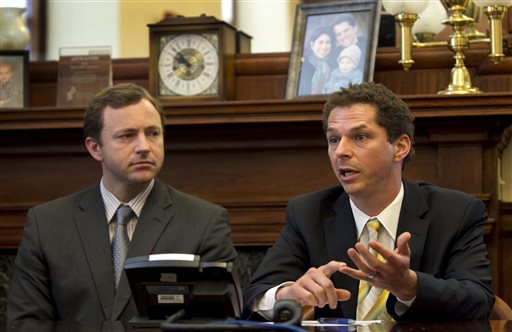AUGUSTA — In a session marked by fiercely partisan battles between Republican Gov. Paul LePage and Democratic lawmakers, both sides can claim some major victories and some significant losses.
Lawmakers went home this week, leaving behind a session that brought fear of a government shutdown, dozens of vetoed bills and squabbles over a television set. They are expected to return this fall to take up bonds.
Until then, Democrats can celebrate perhaps the biggest win of the session with approval of the $6.3 billion, two-year budget opposed by LePage because it contains tax increases.
But LePage and Republicans came out on top in many other debates.
The GOP blocked nearly 80 bills from going into law, including one of the Democrats’ top priorities, a bill to expand health care coverage to 70,000 Mainers under the federal health care overhaul.
“I really truly believe that the biggest losers here are the people of Maine,” House Speaker Mark Eves, D-North Berwick said about the failure to expand Medicaid.
But House GOP Leader Kenneth Fredette of Newport said Medicaid expansion failed like a slew of other bills this session because Democrats failed to compromise with Republicans.
The Republican caucus’ biggest accomplishment was being “able to sustain the governor’s vetoes on areas where there hadn’t been real efforts at common ground,” Fredette said. “When you’re passing legislation that doesn’t have any Republican support, it becomes very easy for a governor to veto that and for Republicans to sustain it,” he said.
Here’s a look at who won and who lost on some of the session’s biggest battles:
• Budget: The Legislature provided the biggest blow to LePage this session when it voted to override his budget veto. LePage rejected the budget because it temporarily raises Maine’s sales, meals and lodging taxes. He said he’d rather shut down the government than pass a bad budget. The Legislature disagreed. Afterward, a defeated LePage said he felt like Charles Cornwallis, a British general during the American Revolution who “won most of the battles, but lost the war.” He said he’ll try to repeal those tax increases in January.
LePage also had wanted to suspend municipal revenue sharing, an idea met by staunch opposition from Maine’s communities. Democrats restored some of the funds, but cities and towns still will lose about $75 million in revenue-sharing dollars over the next two years.
• Education: Democrats also came out on top in the education funding battle. LePage had wanted to set aside about $18 million in the education budget for special projects such as adult education and career and technical education centers. But Democrats cut much of the proposed funding for those programs and instead put that money toward a fund that provides money for schools based on enrollment and property values.
• Medicaid expansion: One of the Democrats’ top priorities — to expand Medicaid coverage to 70,000 Mainers under the federal health care overhaul — failed when they weren’t able to muster enough Republican support to override the governor’s veto. It was a victory for LePage and Republicans, who said they worried about the long-terms costs. But Democrats say Medicaid expansion isn’t dead yet. House Speaker Mark Eves said lawmakers will revisit the issue in January.
• Hospital debt: A big win for LePage was the Legislature’s approval of his bill to repay the state’s hospitals hundreds of millions of dollars in unpaid Medicaid services. Lawmakers agreed that the hospitals had to be repaid, but squabbled over how to do it. Democrats failed in their attempt to tie the bill to Medicaid expansion.
* Vetoes: The Republican minority showed its strength by sustaining nearly all of LePage’s record-breaking number of vetoes this session. From a minimum wage increase to a limit on the use of unmanned aerial drones, dozens of bills died when Democrats couldn’t muster enough votes for an override.
*Energy: Republicans and Democrats can both claim victory for a comprehensive energy bill designed to expand the region’s natural gas infrastructure and lower energy costs. But LePage won a big part of the energy battle. LePage pushed for legislation to give the University of Maine a chance to compete on an offshore wind project. Some Democrats said reopening the bidding process would jeopardize Norwegian company Statoil’s investment in a pilot project. But enough lawmakers backed LePage’s measure for it to go into law. Statoil responded by postponing the project and threatening to look elsewhere, but LePage says that reopening the process and encouraging competition will be better for the development of Maine’s offshore wind industry.
•The television: While minor, the squabble over a television outside of LePage’s office illustrated the bitterness between LePage and Democratic leaders this session, which started with LePage rebuffing Democratic leaders’ request to meet with him. LePage temporarily decamped to the Blaine House to conduct business after Democrats insisted that LePage remove the television screen that scrolled political messages.
LePage had the final word, mounting the TV inside his office in a location that remained visible from the Hall of Flags. On the last day of the session, LePage’s message — quote from former President Calvin Coolidge that says “It’s better to block a bad law than sign a good one” — could still be read by all.
Send questions/comments to the editors.



Success. Please wait for the page to reload. If the page does not reload within 5 seconds, please refresh the page.
Enter your email and password to access comments.
Hi, to comment on stories you must . This profile is in addition to your subscription and website login.
Already have a commenting profile? .
Invalid username/password.
Please check your email to confirm and complete your registration.
Only subscribers are eligible to post comments. Please subscribe or login first for digital access. Here’s why.
Use the form below to reset your password. When you've submitted your account email, we will send an email with a reset code.